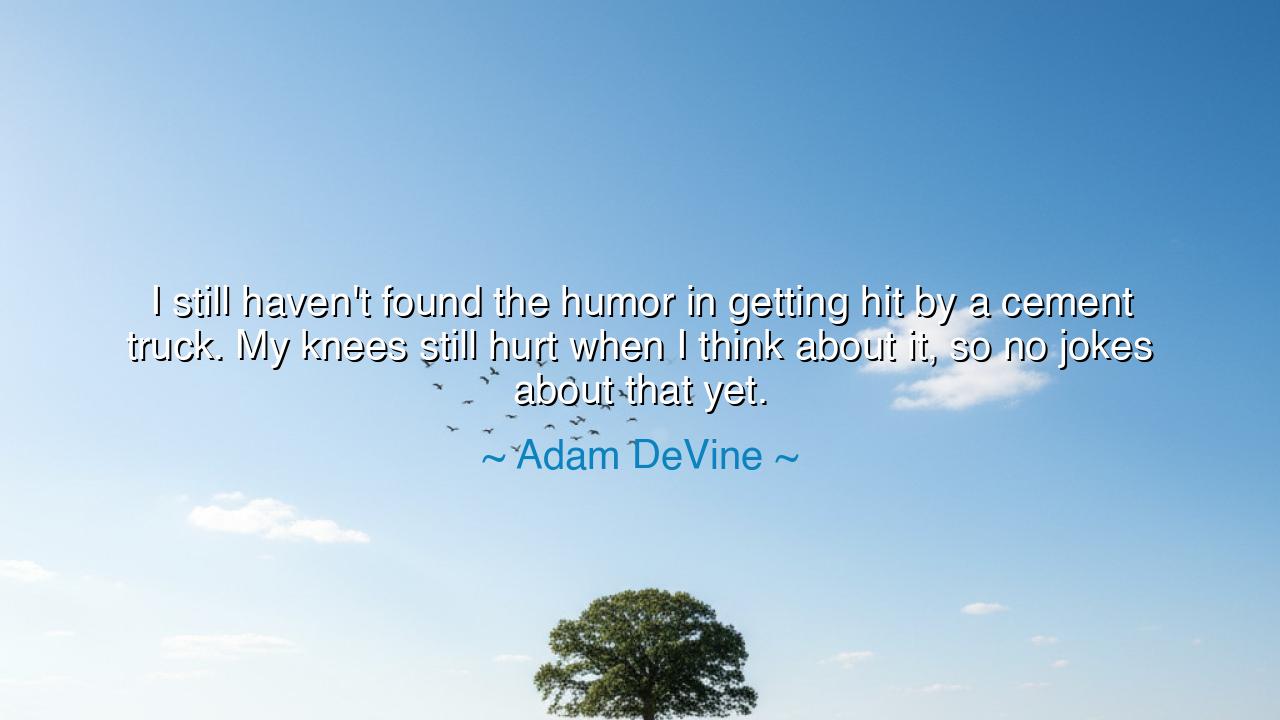
I still haven't found the humor in getting hit by a cement truck.
I still haven't found the humor in getting hit by a cement truck. My knees still hurt when I think about it, so no jokes about that yet.





In the vast and unyielding journey of life, we are all tested in ways both great and small, by forces that often seem beyond our control. The road before us is not always smooth; it is filled with obstacles, sudden turns, and moments of intense pain that shape the very core of our being. Adam DeVine, with his sharp wit and irreverent humor, brings forth a profound truth in his words: "I still haven't found the humor in getting hit by a cement truck. My knees still hurt when I think about it, so no jokes about that yet." In these words, there lies a lesson about the nature of suffering, the healing power of humor, and the delicate balance between the two.
The journey of life, as the ancients knew well, is fraught with both joy and sorrow. And sometimes, the greatest trials come when we least expect them—when the forces of fate seem to strike us down in an instant. To be struck by a cement truck, as DeVine describes, is no small matter. It is a cataclysmic event, a violent collision of body and destiny. In such a moment, humor seems far away, a distant shore that can only be reached once the wounds of the body and soul have begun to heal. It is a reminder that pain—whether physical or emotional—cannot always be dismissed with a joke. Humor may be a salve for the wounds of life, but sometimes, we must acknowledge the hurt before we can begin to heal.
The ancient Greeks, in their exploration of the human experience, knew that pain and suffering were inevitable parts of life. They wrote of heroes who faced great challenges, battles, and losses, and yet, within their stories, there was always a spark of humor. Hercules, a mighty and tragic hero, endured labors that seemed beyond human endurance, but he also found moments of levity amidst his trials. The gods, too, were often portrayed as both capricious and playful, their divine mischief offering a sense of balance in the lives of men. Yet, in these tales, there was always an understanding: while humor can help us endure suffering, it must come after the pain is felt, after the grief has had its time to express itself.
In DeVine’s words, there is an important truth for all who suffer: sometimes, the pain we experience cannot be immediately understood or laughed away. There are moments in life when we are struck by forces so unforgiving—be it physical injury, personal loss, or the crushing weight of life’s hardships—that no joke can relieve the pressure of the moment. The healing process is not always immediate; there are times when the knees still hurt, when the body still remembers the trauma, and when humor must wait. This is the path that we, too, must walk when confronted with our own tragedies. We must first honor the pain, feel it fully, before we can seek to transform it into something else.
Consider the story of Theodoric the Great, the king of the Ostrogoths, who, after a fierce battle, found himself wounded and weakened by his struggles. Yet, through his resilience and determination, he did not allow his physical suffering to define him forever. In the years that followed, Theodoric used humor and light-heartedness to connect with his people, to soften the harshness of his reign. However, in his early moments of suffering, humor did not come to him immediately—he first needed to embrace the pain and grief of his wounds before he could laugh once more. His healing was a process, much as it is for each of us. Humor follows suffering, not because it replaces the pain, but because it helps us to reclaim our strength from the depths of that suffering.
In our own lives, we often encounter moments of trial that seem insurmountable, much like being struck by a cement truck. These experiences may leave us scarred, physically or emotionally. But DeVine’s words offer a lesson that we must carry with us: that it is okay to feel the weight of the pain before we attempt to laugh it off. Healing comes in stages. There is no rush to find humor in the things that have deeply wounded us, for the pain must first be honored. Only then, when the time is right, will we find the strength to transform that pain into something else—something that can be shared, something that can bring light into the darkness.
The wisdom of DeVine thus teaches us to be patient with ourselves and with others as we navigate the complexities of life’s hardships. When pain strikes, we must not immediately look for ways to cover it with humor. Instead, we must allow ourselves to sit with it, to experience it fully, and to understand its lessons. Humor, when it does arrive, will be far more powerful for having been allowed to emerge at the proper time. So, let us not rush to dismiss the darkness of life, but rather, let us honor the space it occupies before we seek the light. For it is through the balance of suffering and laughter that we come to understand the fullness of our human experience.






AAdministratorAdministrator
Welcome, honored guests. Please leave a comment, we will respond soon